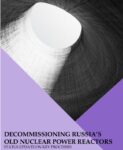
Decommissioning Russia’s old nuclear power reactors: status update on key processes 2019
Russia’s fleet of nuclear power reactors is aging. In fact, 23 out of 35 operating reactors have passed their designed lifetime, which means 66% of the reactors are overdue. Chapter 1 tells about the current status of nuclear power reactors in Russia.
Plans and information on decommissioning is missing. A law from February 2019 requires all Russian nuclear power plants must have a decommissioning concept. But when we have asked operators of the nuclear power plant to provide these concepts, and to inform about when they plan to end operation, we don’t get satisfactory answers, as shown in chapter 2. This can provide an example of the difficulties to work with nuclear and other environmental issues in Russia.
Radioactive Waste and Spent Nuclear Fuel Management in Russia
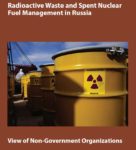 One of the areas of state policy in the sphere of radioactive waste and spent nuclear fuel management is the provision of environmental safety for the population.
One of the areas of state policy in the sphere of radioactive waste and spent nuclear fuel management is the provision of environmental safety for the population.
On the basis of general legal principles, the state policy of Russia on radioactive waste (RW) and spent nuclear fuel (SNF) management, should not contradict the fundamental rights and legitimate interests of its citizens. The right to a favorable environment, ecological and radiation safety, and sustainable use of natural resources belongs both to the current and future generations. These rights are legally important and they must determine the essence of adopted normative acts. For this purpose the state policy of RW and SNF management cannot contradict the national environmental policy.
Russian and international non-governmental organizations have their own opinion on the problem of RW and SNF disposal outlined in various documents. NGO members of the DECOMMISSION International Network have been analysing the experience of safe disposal of RW and SNF for over ten years.
This analysis is based on the official printed state documents and positions of the NGOs – members of the DECOMMISSION International Network.
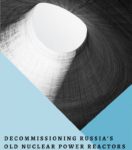
Decommissioning Russia’s old nuclear power reactors — Status update on key processes 2018
This report sums up the situation for Russian nuclear power plant decommissioning, and the main changes in 2018. The report is part of the project “From closed rooms to openness”. The report contains summary of an expertise on Leningrad nuclear power plant’s decommissioning plan, and a summary of the report “Resource development of the Arctic region and NGO’s opinion”.
See the report here: http://decommission.ru/wp-content/uploads/2019/04/Status_update_on_key_processes_2018.pdf
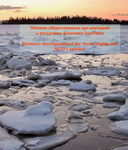
Resource development of the Arctic region and NGO’s opinion
Arctic is a highly discussed region now. For example, the Arctic is mentioned when discussion goes about climate change and melting of Arctic ice, new oil and gas fields, or the Arctic Council, which represents the interests of the peoples of the Arctic and the Arctic countries.
In this report, we want to present you the Arctic strategy, developed by the Russian Federation and how it may impact the environment and people. You can find out what is the main priority of the Government of the Russian Federation in this region for the near future.
De-ecologization of the norms of environmental protection and natural resources legislation, and reducing the access to ecological control by the society
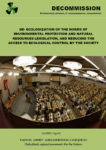 When characterising the modern environmental protection and natural resources legislation, it is possible to point out the general tendencies of its development. Along with certain positive tendencies (standardization, systematisation and others), there are also regressive elements to observe. Now, in specific branches of the legislation, there are changes towards a weakening of the requirements for environmental protection and an expanding space for uncontrolled environmental management.
When characterising the modern environmental protection and natural resources legislation, it is possible to point out the general tendencies of its development. Along with certain positive tendencies (standardization, systematisation and others), there are also regressive elements to observe. Now, in specific branches of the legislation, there are changes towards a weakening of the requirements for environmental protection and an expanding space for uncontrolled environmental management.
Considering the constitutional principle of division of the government in the Russian Federation, guaranteeing non-interference to these or other branches of power from the
activity of each other, it is necessary to separate the de-ecologization of the legislation and the de-ecologization of the public administration.
Concept of a Decommission Plan for Old Nuclear Power Reactors (Guiding Principles from Environmental NGOs)
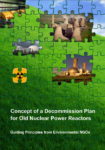 The Concept mission is to involve authorities, nuclear industry and general Russian public in the process of the timely planning of safe decommissioning of nuclear power units, which have reached their design lifecycle limit. Decommissioning is a complex, expensive and long-term process. It requires the integrated solution of technological, environmental, social, financial and ethical problems. For the Concept preparation the available Russian experience has been analyzed, other sources included materials and documents acquired during trips and acquaintance with the decommissioning experience of Ignalina NPP (Lithuanian town Visaginas) and NPP Nord (German town Greifswald). Both nuclear plants had units similar to those, which are operated in the North-West Russia (Leningrad and Kola NPPs).
The Concept mission is to involve authorities, nuclear industry and general Russian public in the process of the timely planning of safe decommissioning of nuclear power units, which have reached their design lifecycle limit. Decommissioning is a complex, expensive and long-term process. It requires the integrated solution of technological, environmental, social, financial and ethical problems. For the Concept preparation the available Russian experience has been analyzed, other sources included materials and documents acquired during trips and acquaintance with the decommissioning experience of Ignalina NPP (Lithuanian town Visaginas) and NPP Nord (German town Greifswald). Both nuclear plants had units similar to those, which are operated in the North-West Russia (Leningrad and Kola NPPs).